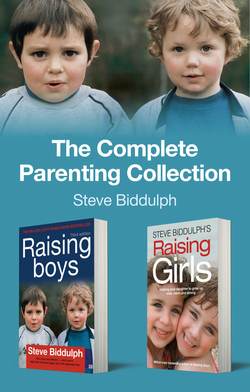Читать книгу The Complete Parenting Collection - Steve Biddulph, Steve Biddulph - Страница 10
The three stages at a glance
Оглавление1 The first stage of boyhood is from birth to six – the span of time when the boy primarily belongs to his mother. He is ‘her’ boy, even though his father may play a very big role, too. The aim at this age is to give strong love and security, and to ‘switch a boy on’ to life as a warm and welcoming experience.
2 The second stage includes the years from six to fourteen – when the boy, out of his own internal drives, starts wanting to learn to be a man, and looks more and more to his father for interest and activity (although his mother remains very involved, and the wider world is beckoning, too). The purpose of this stage is to build competence and skill while also developing kindness and playfulness – you help him to become a balanced person. This is the age when a boy becomes happy and secure about being male.
3 Finally, the years from fourteen to adult – when the boy needs input from male mentors if he is to complete the journey to being fully grown-up. Mum and Dad step back a little, but they must organise some good mentors in their son’s life; if not, he will have to rely on an ill-equipped peer group for his sense of self. The aim is for your son to learn skills, responsibility and self-respect by joining more and more with the adult community.
These stages do not indicate a sudden or sharp shift from one parent to another.
It’s not like the mum stage, the dad stage and the mentor stage. For instance, an involved dad can do a huge amount from birth onwards, or even take the role a mother usually has if need be. And a mother doesn’t quit when a boy reaches six – quite the opposite. The stages indicate a shift in emphasis: the father ‘comes to the fore’ more from six to thirteen, and the importance of mentors increases from fourteen onwards. In a sense, it’s about adding new ingredients at each stage.
The three stages help us know what to do. For example, we know that fathers of boys from six to fourteen must not be just busy workaholics, or absent themselves emotionally or physically from the family. If they do, this will certainly damage their sons. (Yet most fathers of the twentieth century did just that – as many of us can remember from our own childhood.)
The stages tell us that we must look for extra help from the community when our sons are in their mid-teens – the role that used to be taken by extended family members (uncles and grandfathers) or by the tradesman-apprentice relationship. Too often, teenagers move outwards into the big world but no-one is there to catch them, and they spend their teens and early adulthood in a dangerous halfway stage, with only peers to depend on.
It’s a fair bet that many problems with boys’ behaviour – poor school motivation, depression, young men getting into strife with the law (drink-driving, fights, crime, etc.) – have escalated because we haven’t known about these stages and provided the right human ingredients at the right times.
The stages are so important that we must look at each of them in more detail and decide how to respond. That’s what we’ll do now.
